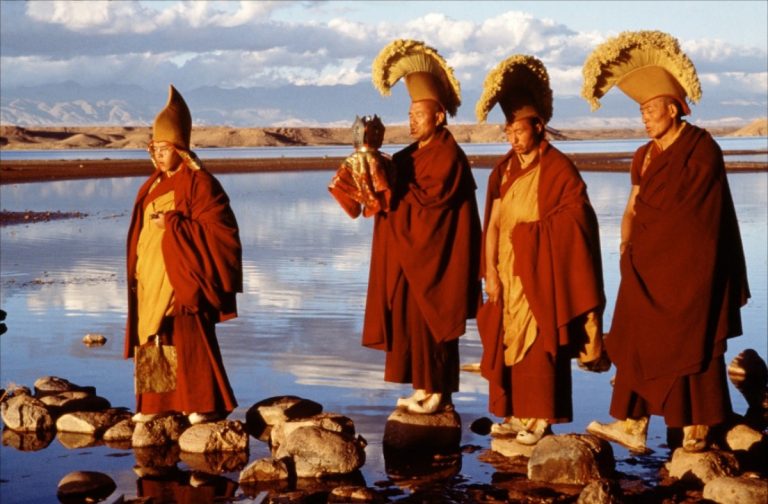Although he had spent the better part of his career making scathing political and social satires like “Peep Show” and “In the Loop,” Jesse Armstrong became a household name to American entertainment pundits thanks to “Succession,” the epic HBO drama series that became hailed as an instant classic.
With its Shakespearean themes, shockingly relevant material, and powerful performances, “Succession” proved to be a natural heir apparent to classic shows like “Mad Men” or “The Sopranos.” It’s been unsurprising that many of its key creatives have doubled down on their film careers in wake of the brilliant “Succession” finale; frequent director Mark Mylod made his cinematic debut with “The Menu,” Kieran Culkin took home an Oscar for “A Real Pain,” and Jeremy Strong has landed many acclaimed parts, and even recently served on the Cannes jury.
Armstrong may have been the creative instigator of “Succession,” but his new feature “Mountainhead” is a singular effort. Shot within the last few months on a tight script, reminiscent of the work of an early David Mamet, “Mountainhead” is the story of four tech billionaires who share an extended retreat together in the wake of a groundbreaking development in artificial intelligence. Ven Perish (Corey Michael Smith), also known as “Ven,” has launched the social media giant Traam, which has immediately caused a global catastrophe amidst an ongoing revolutionary crisis.
Ven’s getaway is hosted by Hugo Van Yalk (Jason Schwartzman), known to his friends as “Souper,” a comparatively less wealthy “tech bro” who has meticulously prepared his luxurious home for the arrival of his friends. Joining the trip under duress is Randall Garrett (Steve Carell), a mentor to the group who was recently diagnosed with cancer. The wild card is Jeff Abredazi (Ramy Youssef), an AI specialist who has publicly feuded with Ven in the past. Although the two take the time to clear the heir before the evening commences, there’s a lingering sense of tension as Ven suggests to Jeff that Traam purchase his AI venture, Bilter.
Anyone nostalgic for “Succession” will certainly be fulfilled by the dialogue in “Mountainhead,” as Armstrong has once again captured the didactic, snarky nature of wealthy media giants. As was the case with “Succession,” “Mountainhead” alludes to the existence of recent historical events, developments in technology, and political figures without getting too detailed.
Taking the time to develop an alternate version of the present would not only give Armstrong too much worldbuilding to handle, but it would also suspend the disbelief of audience, who are led to understand that the story takes place in a realistic setting. “Mountainhead” has the benefit of having characters who have known each other for quite some time. While there’s an entire history mapped out, the film provides important details through implication and vague references.
The humor in “Mountainhead” comes from its astute analysis of America’s relationship with corporations, as in actuality, it’s a relatively small group of people that make decisions that impact the globe. Condensing this down to just one group of friends in one location gives Armstrong the intimacy of a stage production, but the effect on the outside world is still felt. “Mountainhead” takes a lot of shots at the ignorance and social awkwardness of a class that has become divorced from reality, but it doesn’t settle for being smug; even if “Mountainhead” eventually evolves into shenanigans, that doesn’t mean the issues that it’s discussing are any less relevant.
Carrell has worked adjacent to the Armstrong universe, as he delivered one of his stronger dramatic roles in “The Big Short,” directed by Adam McKay, a producer on “Succession” who also directed the pilot. Carrell has played removed, obnoxious characters before, but his uncaring attitude as Garrett easily makes for the film’s most chilling performance. Garrett’s struggles with his own morality have not humanized him, as he is now given less reason to care about the ramifications of his actions. Although he initially serves as a counselor who squashes the tension between Ven and Jeff, Garrett steadily becomes a malevolent influence who preys like a hawk on his more susceptible friends.
Smith has been a breakout star in recent years, with his heartbreakingly wounded performance in “May December” and his arrogant aggressiveness as Chevy Chase in “Saturday Night” being standouts. “Mountainhead” allows him to merge both sensibilities, as Ven is both an unsparingly cynical opportunist and a petulant child who sees success as validation. Ven’s desire to be respected, coupled with his obsession with power, gives “Mountainhead” its most compelling character arc, as he’s placed in more vulnerable situations as the situation grows more dire.
Schwartzman may be the most openly comedic performance in the film, as Souper’s wish to be taken seriously results in some of the more humorous exchanges; it’s a credit to Schwartzman that Souper can appear totally pathetic, but remains completely believable as a businessman of significant influence. The only weak link in the cast is Youssef, whose lack of irony strikes tonal dissonance with his co-stars. Youssef’s delivery of Armstrong’s desire feels a bit too pointed, as it disrupts the rhythmic back-and-forth of the conversations.
“Mountainhead” is bound to attract controversy based on the dramatic shift in tone that occurs towards the middle of the film, in which subtleties are dropped in favor of a much starker observation about the value of human life. While Armstrong is able to expand on all the possibilities of such an absurd scenario, it does feel like a disappointment compared to the more grounded sensibilities of the first act. At times, it feels as if Armstrong may have been better suited to expand the story of “Mountainhead” over the course of several episodes of television. While he remarkably delivers well-realized characters in less than two hours, “Mountainhead” does struggle to navigate between plot points in a naturalistic way.
There was an era in which HBO would regularly produce politically-themed television films like “Recount,” “All the Way,” “Game Change,” or “The Wizard of Lies,” which, despite their star power and sharp writing, were evidently made on a television budget. While “Mountainhead” falls into the same category, it’s also experimental in its world-building and filled with provocative insinuations that span beyond the medium. “Mountainhead” isn’t an announcement that Armstrong will be just as influential in film as he was in television, but it’s a rather entertaining follow-up for those who miss the “Succession”-filled hole in their viewing schedules.









